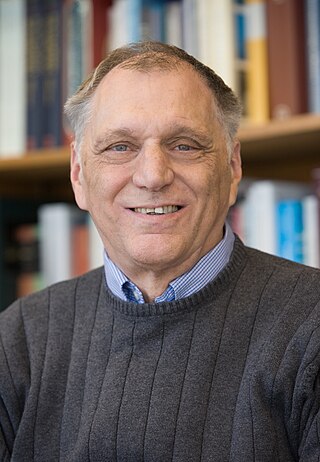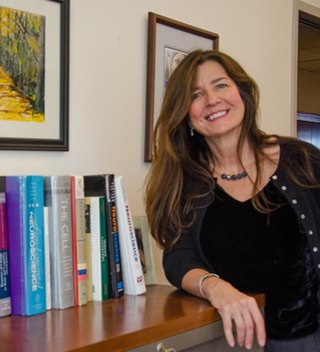Related Research Articles
Psychology is the study of mind and behavior. Its subject matter includes the behavior of humans and nonhumans, both conscious and unconscious phenomena, and mental processes such as thoughts, feelings, and motives. Psychology is an academic discipline of immense scope, crossing the boundaries between the natural and social sciences. Biological psychologists seek an understanding of the emergent properties of brains, linking the discipline to neuroscience. As social scientists, psychologists aim to understand the behavior of individuals and groups.
Linda B. Smith is an American developmental psychologist internationally recognized for her theoretical and empirical contributions to developmental psychology and cognitive science, proposing, through theoretical and empirical studies, a new way of understanding developmental processes. Smith's works are groundbreaking and illuminating for the field of perception, action, language, and categorization, showing the unique flexibility found in human behavior. She has shown how perception and action are ways of obtaining knowledge for cognitive development and word learning.

The Psychonomic Society is an international scientific society of over 4,500 scientists in the field of experimental psychology. The mission of the Psychonomic Society is to foster the science of cognition through the advancement and communication of basic research in experimental psychology and allied sciences. It is open to international researchers, and almost 40% of members are based outside of North America. Although open to all areas of experimental and cognitive psychology, its members typically study areas such as learning, memory, attention, motivation, perception, categorization, decision making, and psycholinguistics. Its name is taken from the word psychonomics, meaning "the science of the laws of the mind".

Michael I. Posner is an American psychologist who is a researcher in the field of attention, and the editor of numerous cognitive and neuroscience compilations. He is emeritus professor of psychology at the University of Oregon, and an adjunct professor at the Weill Medical College in New York. A Review of General Psychology survey, published in 2002, ranked Posner as the 56th most cited psychologist of the 20th century.

Lisa Feldman Barrett is a University Distinguished Professor of psychology at Northeastern University, where she focuses on affective science. She is a director of the Interdisciplinary Affective Science Laboratory. Along with James Russell, she is the founding editor-in-chief of the journal Emotion Review. Along with James Gross, she founded the Society for Affective Science.

Philip E. Rubin is an American cognitive scientist, technologist, and science administrator known for raising the visibility of behavioral and cognitive science, neuroscience, and ethical issues related to science, technology, and medicine, at a national level. His research career is noted for his theoretical contributions and pioneering technological developments, starting in the 1970s, related to speech synthesis and speech production, including articulatory synthesis and sinewave synthesis, and their use in studying complex temporal events, particularly understanding the biological bases of speech and language.

John Terrence Cacioppo was the Tiffany and Margaret Blake Distinguished Service Professor at the University of Chicago. He founded the University of Chicago Center for Cognitive and Social Neuroscience and was the director of the Arete Initiative of the Office of the Vice President for Research and National Laboratories at the University of Chicago. He co-founded the field of social neuroscience and was member of the department of psychology, department of psychiatry and behavioral neuroscience, and the college until his death in March 2018.

Nora S. Newcombe is the Laura H. Carnell Professor of Psychology and the James H. Glackin Distinguished Faculty Fellow at Temple University. She is a Canadian-American researcher in cognitive development, cognitive psychology and cognitive science, and expert on the development of spatial thinking and reasoning and episodic memory. She was the principal investigator of the Spatial Intelligence and Learning Center (2006-2018), one of six Science of Learning Centers funded by the National Science Foundation.

Susan Goldin-Meadow is the Beardsley Ruml Distinguished Service Professor in the Departments of Psychology, Comparative Human Development, the college, and the Committee on Education at the University of Chicago. She is the principal investigator of a 10-year program project grant, funded by the National Institute of Child Health and Human Development, designed to explore the impact of environmental and biological variation on language growth. She is also a co-PI of the Spatial Intelligence and Learning Center (SILC), one of six Science of Learning Centers funded by the National Science Foundation to explore learning in an interdisciplinary framework with an eye toward theory and application. She is the founding editor of Language Learning and Development, the official journal of the Society for Language Development. She was President of the International Society for Gesture Studies from 2007–2012.

Larry Ryan Squire is a professor of psychiatry, neurosciences, and psychology at the University of California, San Diego, and a Senior Research Career Scientist at the Veterans Affairs Medical Center, San Diego. He is a leading investigator of the neurological bases of memory, which he studies using animal models and human patients with memory impairment.
Some of the research that is conducted in the field of psychology is more "fundamental" than the research conducted in the applied psychological disciplines, and does not necessarily have a direct application. The subdisciplines within psychology that can be thought to reflect a basic-science orientation include biological psychology, cognitive psychology, neuropsychology, and so on. Research in these subdisciplines is characterized by methodological rigor. The concern of psychology as a basic science is in understanding the laws and processes that underlie behavior, cognition, and emotion. Psychology as a basic science provides a foundation for applied psychology. Applied psychology, by contrast, involves the application of psychological principles and theories yielded up by the basic psychological sciences; these applications are aimed at overcoming problems or promoting well-being in areas such as mental and physical health and education.
Psychology encompasses a vast domain, and includes many different approaches to the study of mental processes and behavior. Below are the major areas of inquiry that taken together constitute psychology. A comprehensive list of the sub-fields and areas within psychology can be found at the list of psychology topics and list of psychology disciplines.

Avishai Henik is an Israeli neurocognitive psychologist who works at Ben-Gurion University of the Negev (BGU). Henik studies voluntary and automatic (non-voluntary/reflexive) processes involved in cognitive operations. He characterizes automatic processes, and clarifies their importance, the relationship between automatic and voluntary processes, and their neural underpinnings. Most of his work involves research with human participants and in recent years, he has been working with Archer fish to examine evolutionary aspects of various cognitive functions.
The Society for Experimental Psychology and Cognitive Science (SEPCS) (also known as American Psychological Association Division 3; formerly known as the Division of Experimental Psychology and the Division for Theoretical-Experimental Psychology) is a scholarly organization of psychologists in the principal area of general experimental psychology. The goals of this society are to promote, advance, and increase inclusion and exchange of ideas among the scholars in the many subfields of experimental psychology (including but not limited to behavior analysis, psychophysics, comparative, social, developmental, bio/physiological/neuropsychology/behavioral neuroscience, and the many topic areas of cognitive psychology, such as the study of memory, attention, language, intelligence, decision making, and so forth), both in basic and applied research. The society focuses on supporting research through advocacy, training and education, public policy, and outreach. It engages in a wide variety of service work, including leadership in the American Psychological Association's governance.
Alice Fenvessy Healy is a psychologist and College Professor of Distinction Emeritus at the University of Colorado Boulder where she founded and directed the Center for Research on Training. She is known for her research in the field of cognitive psychology, spanning diverse topics including short-term memory, long-term memory, psycholinguistics, reading, decision-making, and cognitive training.
Rachel Keen is a developmental psychologist known for her research on infant cognitive development, auditory development, and motor control. She is Professor Emeritus of Psychology at the University of Virginia.
Adriana Galván is an American psychologist and expert on adolescent brain development. She is a professor of psychology at the University of California, Los Angeles (UCLA) where she directs the Developmental Neuroscience laboratory. She was appointed the Jeffrey Wenzel Term Chair in Behavioral Neuroscience and the Dean of Undergraduate Education at UCLA.

BJ Casey is an American cognitive neuroscientist and expert on adolescent brain development and self control. She is the Christina L. Williams Professor of Neuroscience at Barnard College of Columbia University where she directs the Fundamentals of the Adolescent Brain (FAB) Lab and is an Affiliated Professor of the Justice Collaboratory at Yale Law School, Yale University.
References
- ↑ "Federation of Associations in Behavioral and Brain Sciences journal: Policy Insights from the Behavioral and Brain Sciences". Psychological Science Agenda. American Psychological Association. February 2018. Retrieved 2019-01-06.
- ↑ "Federation of Associations in Behavioral and Brain Sciences - GuideStar Profile". www.guidestar.org. Retrieved 2021-10-27.
- ↑ "George Mandler Curriculum Vitae". University of California, San Diego . Retrieved 2019-01-06.
- ↑ Weiner, Irving B.; Healy, Alice F.; Proctor, Robert W. (2012-10-16). Handbook of Psychology, Experimental Psychology. John Wiley & Sons. p. 689. ISBN 9780470649930.
- ↑ "About". Federation of Associations in Behavioral & Brain Sciences. Retrieved 2019-01-06.
- ↑ "Scientific Societies". Federation of Associations in Behavioral & Brain Sciences. Retrieved 2019-01-06.